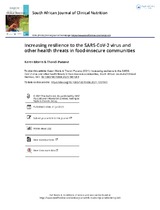| dc.contributor.author | Morris, Karen | |
| dc.contributor.author | Puoane, Thandi | |
| dc.date.accessioned | 2021-11-09T11:55:14Z | |
| dc.date.available | 2021-11-09T11:55:14Z | |
| dc.date.issued | 2021 | |
| dc.identifier.citation | Morris, K., & Puoane, T. (2021). Increasing resilience to the SARS-CoV-2 virus and other health threats in food-insecure communities. South African Journal of Clinical Nutrition, 1–2. https://doi.org/10.1080/16070658.2021.1951951 | en_US |
| dc.identifier.issn | 1607-0658 | |
| dc.identifier.uri | https://doi.org/10.1080/16070658.2021.1951951 | |
| dc.identifier.uri | http://hdl.handle.net/10566/6998 | |
| dc.description.abstract | The health of the majority of South Africa’s population is seriously threatened by hunger and micronutrient deficiency, with
impaired immune response a real threat, which the current SARSCoV-2 virus pandemic has highlighted. Traditional
household food-processing techniques can, amongst other advantages, increase nutrient bioavailability in affordable staple
foods and hence provide a way, in part, to alleviate malnutrition for food-insecure communities. In this way, immune
defence and pathogen resilience of the food insecure could be enhanced so that they can better survive both COVID-19
and future threats. | en_US |
| dc.language.iso | en | en_US |
| dc.publisher | MedPharm Publications | en_US |
| dc.subject | Covid-19 | en_US |
| dc.subject | Food insecurity | en_US |
| dc.subject | Food security | en_US |
| dc.subject | Health shocks | en_US |
| dc.subject | Malnutrition | en_US |
| dc.subject | Economic shocks | en_US |
| dc.subject | South Africa | en_US |
| dc.title | Increasing resilience to the SARS-CoV-2 virus and other health threats in food-insecure communities | en_US |
| dc.type | Article | en_US |

